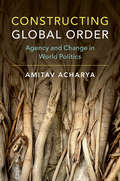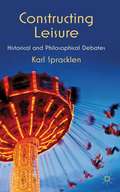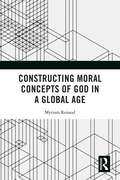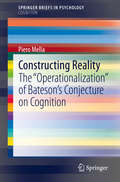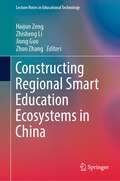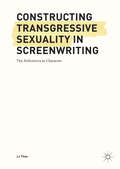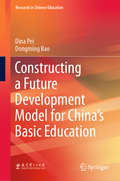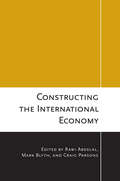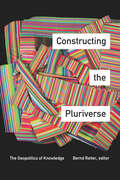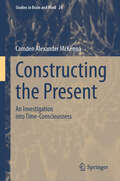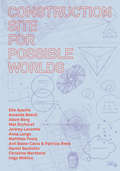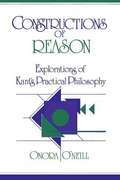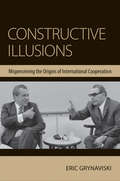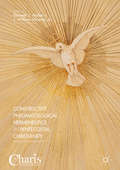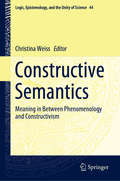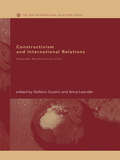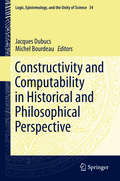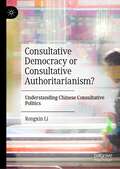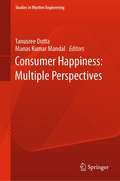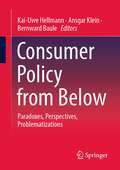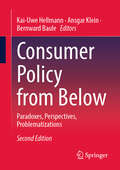- Table View
- List View
Constructing Global Order: Agency and Change in World Politics
by Amitav AcharyaFor a long time, international relations scholars have adopted a narrow view of what is global order, who are its makers and managers, and what means they employ to realize their goals. Amitav Acharya argues that the nature and scope of agency in the global order – who creates it and how – needs to be redefined and broadened. Order is built not by material power alone, but also by ideas and norms. While the West designed the post-war order, the non-Western countries were not passive. They contested and redefined Western ideas and norms, and contributed new ones of their own making. This book examines such acts of agency, especially the redefinitions of sovereignty and security, shaping contemporary world politics. With the decline of the Western dominance, ideas and agency from the Rest may make it possible to imagine and build a truly global order.
Constructing Leisure
by Karl SpracklenThis book looks back at the meaning and purpose of leisure in the past. But this is not a simple social history of leisure. It is not enough to write a history of leisure on its own in fact, it is impossible without engaging in the debate about what counts as leisure (in the present and in the past). Writing a history of leisure, then, entails writing a philosophy of leisure: and any history needs to be a philosophical history as well. That is the purpose of this book. It provides an account of leisure through historical time, how leisure was constructed and understood by historical actors, how communicative reason and free will interacted with instrumentality at different times, how historians have reconstructed past leisure through historiography, and finally, how writers have perceived the meaning and purpose of leisure in alternative histories. Providing a sweeping overview of the field, Karl Spracklen charts how the concept of leisure was understood in Ancient history, through to modern times, and looks at leisure in different societies and cultures including Byzantium and Asian civilizations, as well as looking at leisure and Islam. Spracklen concludes with a chapter on future histories of leisure.
Constructing Moral Concepts of God in a Global Age
by Myriam RenaudConstructing Moral Concepts of God in a Global Age focuses on what people say and think about God, rather than on arguments about God's existence. It advances a theological method, or step-by-step approach to explore and reframe personal convictions about God and the worldviews shaped by those convictions. Since a moral God is more likely to foster a moral life, this method integrates an ethical check to ensure that understandings of God and their associated worldviews are validly moral. The proposed method builds on the work of twentieth-century theologian Gordon Kaufman during the Kantian phase of his work. It anticipates a person-like God who hears prayers, loves without end, and comforts in times of hardship. To accommodate today’s pluralistic and globalized world, the ethical check integrated in the method is a widely collaborative and vetted global ethic, the Parliament of the World’s Religions "Declaration Towards a Global Ethic." This volume of constructive philosophical theology is written for seminary students, educators, clergy, study groups, and anyone interested in delving more deeply and systematically into understandings of God, whether their own or those of others.
Constructing Reality: The "Operationalization" of Bateson’s Conjecture on Cognition (SpringerBriefs in Psychology)
by Piero MellaThis brief presents an overview of Gregory Bateson’s Constructivist method of Cognition. Bateson proposes a theory of cognition that is based on the abstract notion of difference that the mind distinguishes and perceives and represents information that constitutes and separates how different states are ordered, grouped, and classified. Bateson, however, does not clearly indicate how a cognitive system can develop a knowledge of reality from the perception of these differences. This book seeks to offer a scientific approach to Constructivism. Using Bateson’s hypothesis, chapters discuss how our mind distinguishes and elaborates differences, allowing us to form perceptions of objects, and how these objects can be described and compared. Chapters also discuss how from differences, it is possible to construct concepts or ideas of how these can be defined and how to derive from these differences the meanings of the signs used for the structuring of languages. The brief offers a coherent structure of propositions that form an interpretative theory of the modus operandi of the human mind, which will be useful not only in shedding light on our cognitive processes, but also in laying the formal groundwork for artificial intelligence. Constructing Reality is a must-have resource for researchers and students of the cognitive sciences, as well as education sciences, and researchers and scholars of artificial intelligence, learning theory, and intelligent automata programming.
Constructing Regional Smart Education Ecosystems in China (Lecture Notes in Educational Technology)
by Haijun Zeng Zhisheng Li Jiong Guo Zhuo ZhangThis book enriches the understanding of regional smart education in China and promotes sharing of smart education case studies in China and abroad. It presents 46 case studies selected from a total of 644 case studies collected nationwide in China. These selected case studies focus on regional construction, research findings, and solutions. The case studies on regional construction mainly focus on the sustainable development mechanism of regional smart education. The research findings case studies showcase research results produced by research teams and individuals, which involve theories, models, technologies, practical investigations, or international comparisons related to smart education. Lastly, the solution case studies are technical solutions provided by enterprises for the development of smart education, which include application scenarios, methods, and effects in regions or schools around smart educational equipment, platforms, networks, tools, resources, or integrated solutions.
Constructing Transgressive Sexuality in Screenwriting: The Feiticeiro/a as Character
by Lj TheoThis book approaches the construction of complex and transgressive ‘pervert’ characters in mainstream (not ‘art’), adult-oriented (not pornographic) cinema. It deconstructs an episteme on which to base the construction of characters in screenplays, in a way that acknowledges how semiotic elements of characterisation intersect. In addition, it provides an extended re-phrasing of the notion of ‘the pervert’ as Feiticiero/a: a newly-coined construct that might serve as an underpinning for complex, sexual filmic characters that are both entertaining and challenging to audiences. This re-phrasing speaks to both an existential/phenomenological conception of personhood and to the scholarly tradition of the ‘linguistic turn’ of continental philosophers such as Foucault and Lacan, who represent language not primarily as describing the world but as constructing it. The result is an original and interdisciplinary volume that is brought to coherence through a queer, post-humanist lens.
Constructing a Future Development Model for China’s Basic Education (Research in Chinese Education)
by Dina Pei Dongming BaoFocusing on the future development of basic education in China, and on overcoming related issues, this book identifies key breakthroughs, priorities and important fields of basic education reform. In addition, it introduces the “Three Power Model” – decision-making, principals’ leadership, and learning power – to help address the challenges of future development.Unlike much of the research on basic education reform, the book draws on a forward-thinking, realistic and comprehensive project: bringing together 15 universities and research institutes, 16 provincial administration departments, and 100 selected primary and secondary schools, it has also been strongly endorsed by the nation’s leaders. After five years of practice and innovation, it has made significant breakthroughs in many provinces. Sharing unique insights into the project and its outcomes, the book offers an invaluable asset for education researchers, primary and secondary school teachers, and anyone interested in the evolution of basic education in China.
Constructing the International Economy
by Mark Blyth Rawi Abdelal Craig ParsonsFocusing empirically on how political and economic forces are always mediated and interpreted by agents, both in individual countries and in the international sphere, Constructing the International Economy sets out what such constructions and what various forms of constructivism mean, both as ways of understanding the world and as sets of varying methods for achieving that understanding. It rejects the assumption that material interests either linearly or simply determine economic outcomes and demands that analysts consider, as a plausible hypothesis, that economies might vary substantially for nonmaterial reasons that affect both institutions and agents' interests. Constructing the International Economy portrays the diversity of models and approaches that exist among constructivists writing on the international political economy. The authors outline and relate several different arguments for why scholars might attend to social construction, inviting the widest possible array of scholars to engage with such approaches. They examine points of terminological or theoretical confusion that create unnecessary barriers to engagement between constructivists and nonconstructivist work and among different types of constructivism. This book provides a tool kit that both constructivists and their critics can use to debate how much and when social construction matters in this deeply important realm. Contributors: Rawi Abdelal, Harvard Business School; Jacqueline Best, University of Ottawa; Mark Blyth, Brown University; Mlada Bukovansky, Smith College; Jeffrey M. Chwieroth, London School of Economics; Francesco Duina, Bates College; Charlotte Epstein, University of Sydney; Yoshiko M. Herrera, University of Wisconsin-Madison; Paul Langley, Northumbria University; Craig Parsons, University of Oregon; Catherine Weaver, University of Texas at Austin; Wesley W. Widmaier, Saint Joseph's University; Cornelia Woll, CERI-Sciences Po Paris
Constructing the Pluriverse: The Geopolitics of Knowledge
by Bernd ReiterThe contributors to Constructing the Pluriverse critique the hegemony of the postcolonial Western tradition and its claims to universality by offering a set of “pluriversal” approaches to understanding the coexisting epistemologies and practices of the different worlds and problems we inhabit and encounter. Moving beyond critiques of colonialism, the contributors rethink the relationship between knowledge and power, offering new perspectives on development, democracy, and ideology while providing diverse methodologies for non-Western thought and practice that range from feminist approaches to scientific research to ways of knowing expressed through West African oral traditions. In combination, these wide-ranging approaches and understandings form a new analytical toolbox for those seeking creative solutions for dismantling Westernization throughout the world.Contributors. Zaid Ahmad, Manuela Boatcă, Hans-Jürgen Burchardt, Raewyn Connell, Arturo Escobar, Sandra Harding, Ehsan Kashfi, Venu Mehta, Walter D. Mignolo, Ulrich Oslender, Issiaka Ouattara, Bernd Reiter, Manu Samnotra, Catherine E. Walsh, Aram Ziai
Constructing the Present: An Investigation into Time-Consciousness (Studies in Brain and Mind #24)
by Camden Alexander McKennaConstructing the Present: An Investigation into Time-Consciousness investigates what time is like for us as subjects and answers the question of how our experiential present comes to be. While addressing a variety of outstanding debates in the field, the book proposes that our temporal phenomenology is best understood as transcending traditional forms of analysis. The book ultimately concludes that time is not something we experience, but rather the way we construct our experience of the world. In the spirit of William James, McKenna suggests that the present occupies a window of time known as the &“specious present.&” McKenna claims that the duration of this subjective window is determined by the real temporal properties of experience, but also that experiential events are, as Edmund Husserl believed, temporally directed to varying degrees and in nested fashion in a way that affects their particular qualitative character. This specific proposal is called ERA: the Extensional-Retentional Analysis of temporal phenomenology. Besides doing justice to our temporal phenomenology, McKenna&’s overall position aligns with contemporary predictive approaches to the cognitive architecture of the mind. This exciting new way of thinking sees the brain as a predictive engine whose ongoing activities construct our rich subjective experiences. Taking inspiration from this movement, Constructing the Present introduces a complementary position called Temporality as Iterative Expectation Revision (or TIER). According to TIER, temporal phenomenology results from predictive activities of the brain occurring throughout an integrated multilevel cognitive processing hierarchy. Such a system is sensitive to the ongoing flux of environmental stimuli while retaining prior expectations and constantly updating our experiences probabilistically to ensure survival. The actual activity of this ongoing process, rather than its content, gives rise to the felt present, which is continuously constructed anew. Constructing the Present: An Investigation into Time-Consciousness functions as a scholarly defense of a provocative, plausible, and cohesive set of theses, while also confronting numerous adjacent philosophical issues along the way. By approaching the subject from the standpoint of empirically informed philosophy of mind, the present work fills a significant gap in the literature. The book should appeal especially to philosophically inclined researchers and students interested in cognitive science, psychology, and neuroscience, as well as philosophy of mind.
Construction Site for Possible Worlds
by Matthew Poole Robin Mackay Amanda Beech Adam Berg Mat Dryhurst Jeremy Lecomte Anna Longo Anil Bawa-Cavia Patricia Reed Daniel Sacilotto Christine Wertheim Inigo WilkinsPerspectives from philosophy, aesthetics, and art on how to envisage the construction site of possible worlds. Given the highly coercive and heavily surveilled dynamics of the present moment, when the tremendous pressures exerted by capital on contemporary life produces an aggressively normative “official reality,” the question of the construction of other possible worlds is crucial and perhaps more urgent than ever.T his collection brings together different perspectives from the fields of philosophy, aesthetics, and art to discuss the mechanisms through which possible worlds are thought, constructed, and instantiated, forcefully seeking to overcome the contemporary moment's deficit of conceptualizing alternate realities—its apparent fear of imagining possible new and compelling futures—to begin the arduous task of producing the political dynamics necessary for actual construction.Implicit in this dynamic between the imaginary and the possible is the question of how thinking intertwines with both rationality and the inherited contingencies and structures of the world. With no ascertainable ground on which to build, with no confidence in any given that could guarantee our labors, how do we even envisage the construction site(s) of possible worlds, and with what kind of diagrams, tools, and languages can we bring them into being?
Constructions Of Reason: Explorations Of Kant's Practical Philosophy
by Onora O'NeillTwo centuries after they were published, Kant's ethical writings are as much admired and imitated as they have ever been, yet serious and long-standing accusations of internal incoherence remain unresolved. Onora O'Neill traces the alleged incoherences to attempts to assimilate Kant's ethical writings to modern conceptions of rationality, action and rights. When the temptation to assimilate is resisted, a strikingly different and more cohesive account of reason and morality emerges. Kant offers a "constructivist" vindication of reason and a moral vision in which obligations are prior to rights and in which justice and virtue are linked. O'Neill begins by reconsidering Kant's conceptions of philosophical method, reason, freedom, autonomy and action. She then moves on to the more familiar terrain of interpretation of the Categorical Imperative, while in the last section she emphasizes differences between Kant's ethics and recent "Kantian" ethics, including the work of John Rawls and other contemporary liberal political philosophers.
Constructive Illusions: Misperceiving the Origins of International Cooperation
by Eric GrynaviskiAre the best international agreements products of mutual understanding? The conventional wisdom in economics, sociology, and political science is that accurate perceptions of others' interests, beliefs, and ideologies promote cooperation. Obstacles to international cooperation therefore emerge from misperception and misunderstanding. In Constructive Illusions, Eric Grynaviski challenges this conventional wisdom by arguing that when nations wrongly believe they share a mutual understanding, international cooperation is actually more likely, and more productive, than if they had a genuine understanding of each other’s position. Mutual understanding can lead to breakdowns in cooperation by revealing intractable conflicts of interest, identity, and ideology. Incorrectly assuming a mutual understanding exists, in contrast, can enhance cooperation by making actors confide that collaborative ventures are in both parties’ best interest and that both parties have a reliable understanding of the terms of cooperation. Grynaviski shows how such constructive misunderstandings allowed for cooperation between the United States and the Soviet Union between 1972 and 1979. During détente, the superpowers reached more than 150 agreements, established standing consultative committees, regularly held high-level summit meetings, and engaged in global crisis management. The turn from enmity to cooperation was so stark that many observers predicted a permanent end to the Cold War. Why did the superpowers move from confrontation to cooperation? Grynaviski’s theory of the role of misunderstanding in cooperation provides an explanation that is significantly different from liberal institutionalist and constructivist approaches. This book’s central claim is that states can form what French president Valéry Giscard d’Estaing called "a superb agreement based on complete misunderstanding."
Constructive Pneumatological Hermeneutics in Pentecostal Christianity (Christianity and Renewal - Interdisciplinary Studies)
by Kenneth J. Archer And L. William Oliverio Jr.This book presents the work of leading hermeneutical theorists alongside emerging thinkers, examining the current state of hermeneutics within the Pentecostal tradition. The volume’s contributors present constructive ideas about the future of hermeneutics at the intersection of theology of the Spirit, Pentecostal Christianity, and other disciplines. This collection offers cutting-edge scholarship that engages with and pulls from a broad range of fields and points toward the future of Pneumatological hermeneutics. The volume’s interdisciplinary essays are broken up into four sections: philosophical hermeneutics, biblical-theological hermeneutics, social and cultural hermeneutics, and hermeneutics in the social and physical sciences.
Constructive Semantics: Meaning in Between Phenomenology and Constructivism (Logic, Epistemology, and the Unity of Science #44)
by Christina WeissThis edited book brings together research work in the field of constructive semantics with scholarship on the phenomenological foundations of logic and mathematics. It addresses one of the central issues in the epistemology and philosophy of mathematics, namely the relationship between phenomenological meaning constitution and constructive semantics. Contributing authors explore deep structural connections and fundamental differences between phenomenology and constructivism. Papers are drawn from contributions to a prestigious workshop held at the University of Friedrichshafen. Readers will discover insight into structural connections between the phenomenological concept of meaning constitution and constructivist concepts of meaning. Discussion ranges from more specific conceptualizations in the philosophy of logic and mathematics to more general considerations in epistemology, inferential semantics and phenomenology. Questions such as a possible phenomenological understanding of the relationship between structural rules and particle rules in dialogical logic are explored. Significant aspects of both phenomenology and dialectics, and dialectics and constructivism emerge. Graduates and researchers of philosophy, especially logic, as well as scholars of mathematics will all find something of interest in the expert insights presented in this volume.
Constructivism and International Relations: Alexander Wendt and his Critics (New International Relations)
by Stefano Guzzini Anna LeanderThis new book unites in one volume some of the most prominent critiques of Alexander Wendt's constructivist theory of international relations and includes the first comprehensive reply by Wendt. Partly reprints of benchmark articles, partly new original critiques, the critical chapters are informed by a wide array of contending theories ranging from realism to poststructuralism. The collected leading theorists critique Wendt’s seminal book Social Theory of International Politics and his subsequent revisions. They take issue with the full panoply of Wendt’s approach, such as his alleged positivism, his critique of the realist school, the conceptualism of identity, and his teleological theory of history. Wendt’s reply is not limited to rebuttal only. For the first time, he develops his recent idea of quantum social science, as well as its implications for theorising international relations. This unique volume will be a necessary companion to Wendt’s book for students and researchers seeking a better understanding of his work, and also offers one of the most up-to-date collections on constructivist theorizing.
Constructivism in Ethics
by Carla BagnoliAre there such things as moral truths? How do we know what we should do? And does it matter? Constructivism states that moral truths are neither invented nor discovered, but rather are constructed by rational agents in order to solve practical problems. While constructivism has become the focus of many philosophical debates in normative ethics, meta-ethics and action theory, its importance is still to be fully appreciated. These new essays written by leading scholars define and assess this new approach in ethics, addressing such questions as the nature of constructivism, how constructivism improves our understanding of moral obligations, how it accounts for the development of normative practices, whether moral truths change over time, and many other topics. The volume will be valuable for advanced students and scholars of ethics and all who are interested in questions about the foundation of morality.
Constructivity and Computability in Historical and Philosophical Perspective (Logic, Epistemology, and the Unity of Science #34)
by Jacques Dubucs Michel BourdeauRanging from Alan Turing's seminal 1936 paper to the latest work on Kolmogorov complexity and linear logic, this comprehensive new work clarifies the relationship between computability on the one hand and constructivity on the other. The authors argue that even though constructivists have largely shed Brouwer's solipsistic attitude to logic, there remain points of disagreement to this day. Focusing on the growing pains computability experienced as it was forced to address the demands of rapidly expanding applications, the content maps the developments following Turing's ground-breaking linkage of computation and the machine, the resulting birth of complexity theory, the innovations of Kolmogorov complexity and resolving the dissonances between proof theoretical semantics and canonical proof feasibility. Finally, it explores one of the most fundamental questions concerning the interface between constructivity and computability: whether the theory of recursive functions is needed for a rigorous development of constructive mathematics. This volume contributes to the unity of science by overcoming disunities rather than offering an overarching framework. It posits that computability's adoption of a classical, ontological point of view kept these imperatives separated. In studying the relationship between the two, it is a vital step forward in overcoming the disagreements and misunderstandings which stand in the way of a unifying view of logic.
Consultative Democracy or Consultative Authoritarianism?: Understanding Chinese Consultative Politics
by Rongxin LiThis book theorizes Chinese politics, specifically about China’s “deliberative democracy (xieshang minzhu 协商民主)”. Creating a China-West comparative framework, the author interrogates China's government's claims to give representation to citizens, allowing readers to see how all of these concepts interact within Chinese ideology, democratic discourse, and governance, and their relationship with Chinese authoritarianism. Above all, this book represents a sustained hybridization of political theory, one which is neither a simple democratic-authoritarian dichotomy, nor a reinterpretation of the official propaganda. This study will interest scholars of Chinese politics and statecraft, shedding light on an emergent discourse of the state – Chinese xieshang minzhu. More importantly, this book goes beyond a simple rhetorical and linguistic use of ‘deliberative democracy’ in the Western sense, and rather emphasizes the very consultative nature of Chinese politics, which facilitates and reconsolidates Chinese authoritarianism.
Consumed: How Markets Corrupt Children, Infantilize Adults, and Swallow Citizens Whole
by Benjamin R. BarberHow advertising and marketing seek to keep adults thinking like children and seek to advertise to children as if they are able to make choices as independent consumers.
Consumer Happiness: Multiple Perspectives (Studies in Rhythm Engineering)
by Tanusree Dutta Manas Kumar MandalThis book helps quench the quest of knowledge of academicians, researchers, and others interested in developing a complete and critical understanding of consumer happiness. The relentless search of happiness by humans is sought in different ways. Scientific discussion on happiness for long was considered a forte of Philosophers. Other disciplines seldom delved into this. But today not only science but neuroscience, marketing, and other varied fields have started delving into it and have developed a keen interest. The book has been conceptualized on this line of thinking and thus divided into two parts. The first part is customized towards understanding various perspectives of happiness and the relative importance of knowing the same. The first chapter of this section is on the biological perspective of happiness. The second is titled ‘Behavioural perspective’. The third chapter is an attempt to elucidate the cultural perspective of the concept of happiness. The fourth is on the role of technology in inducing happiness. Fifth and sixth are on theories of happiness and measuring happiness, respectively. Knowledge about the different perspective and theories has a wide range of benefits. It informs us about how the brain works, interprets, and reacts. This theoretical understanding helps us to move beyond the trial and error methods towards a more scientific underpinning of adoption of measures that would generate long-lasting happiness in consumers.The second part of the book is dedicated toward understanding consumer happiness from a neuroscience perspective, i.e. keeping consumer happy. This segment has ten chapters. The first is on differentiating the concept of happiness from satisfaction. The second is on sensory marketing and happiness. The third deals with the store design and shelving of products to generate happiness. Fourth and fifth chapters relate to persuading the consumers. While the fourth chapter is on developing persuasive messages and the fifth is on subliminal messaging sixth chapter is on pricing and seventh on advertising. The eighth chapter highlights the role of emotions and the ninth is on the different factors that induce happiness in consumers. The last chapter is about raising some unanswered questions and food for thought for readers. Together the contents of the book make for a complete understanding of the concept of happiness and how it is shaping the world of marketing. Addressing the ‘what’ and ‘how’ of consumer happiness in the same book makes the book comprehensive.
Consumer Policy from Below: Paradoxes, Perspectives, Problematizations
by Ansgar Klein Kai-Uwe Hellmann Bernward BauleSince its existence in the 1950s, consumer policy in Germany has been understood and pursued primarily as a bundle of actions and measures initiated and institutionalised by the state. In many cases, the state has also issued corresponding mandates and set up support models, which has created the impression that we are basically dealing with a 'consumer policy from above' imposed by macro-politics. Not that there have not been repeated attempts in the past decades to give impetus to consumer policy from the middle of civil society - often in the form of small citizens' initiatives. And in recent years in particular, a number of new consumer organisations have emerged which operate much closer to the grass roots. Nevertheless, the impression seems to have taken root among the large, government-related 'players' in the field, who have been in the 'business' for decades, not to mention government-internal consumer policy, that consumer policy concerns a policy field that is essentially ordered by a collaboration of the state on the one hand, and consumer protection organisations representing all consumers equally on the other, while the many small consumer initiatives, not even started by individual committed consumers, regularly fall behind in comparison. This perspective refers largely to the view of and from the centre of politics. This volume is intended to go some way towards countering the institutionally prevailing impression that, in principle, there is only 'consumer policy from above' that is really effective and assertive.The translation was done with the help of artificial intelligence. A subsequent human revision was done primarily in terms of content.
Consumer Policy from Below: Paradoxes, Perspectives, Problematizations
by Ansgar Klein Kai-Uwe Hellmann Bernward BauleSince its existence in the 1950s, consumer policy in Germany has been understood and pursued primarily as a bundle of actions and measures initiated and institutionalised by the state. In many cases, the state has also issued corresponding mandates and set up support models, which has created the impression that we are basically dealing with a 'consumer policy from above' imposed by macro-politics. Not that there have not been repeated attempts in the past decades to give impetus to consumer policy from the middle of civil society - often in the form of small citizens' initiatives. And in recent years in particular, a number of new consumer organisations have emerged which operate much closer to the grass roots. Nevertheless, the impression seems to have taken root among the large, government-related 'players' in the field, who have been in the 'business' for decades, not to mention government-internal consumer policy, that consumer policy concerns a policy field that is essentiallyordered by a collaboration of the state on the one hand, and consumer protection organisations representing all consumers equally on the other, while the many small consumer initiatives, not even started by individual committed consumers, regularly fall behind in comparison. This perspective refers largely to the view of and from the centre of politics. This volume is intended to go some way towards countering the institutionally prevailing impression that, in principle, there is only 'consumer policy from above' that is really effective and assertive.The translation was done with the help of artificial intelligence. A subsequent human revision was done primarily in terms of content.
Consuming Schools
by Trevor NorrisThe increasing prevalence of consumerism in contemporary society often equates happiness with the acquisition of material objects. Consuming Schools describes the impact of consumerism on politics and education and charts the increasing presence of commercialism in the educational sphere through an examination of issues such as school-business partnerships, advertising in schools, and corporate-sponsored curriculum.First linking the origins of consumerism to important political and philosophical thinkers, Trevor Norris goes on to closely examine the distinction between the public and the private sphere through the lens of twentieth-century intellectuals Hannah Arendt and Jean Baudrillard. Through Arendt's account of the human activities of labour, work, and action, and the ensuing eclipse of the public realm and Baudrillard's consideration of the visual character of consumerism, Norris examines how school commercialism has been critically engaged by in-class activities such as media literacy programs and educational policies regulating school-business partnerships.
Consumption And Violence: Radical Protest In Cold-war West Germany
by Alexander SedlmaierCombining the tools of political, social, cultural, and intellectual history, Consumption and Violence: Radical Protest in Cold-War West Germany explores strategies of legitimization developed by advocates of militant resistance to certain manifestations of consumer capitalism. The book contributes to a more sober evaluation of West German protest movements, not just terrorism, as it refrains from emotional and moral judgments, but takes the protesters' approaches seriously, which, regarding consumer society, had a rational core. Political violence is not presented as the result of individual shortcomings, but emerges in relation to major societal changes, i. e. , the unprecedented growth of consumption. This new perspective sheds important light on violence and radical protest in post-war Germany, as previous books have failed to examine to what extent these forms of resistance should be regarded as reactions to changing regimes of provision. Continuing the recently growing interest in the interdependence of countercultures and consumer society, the focus on violence gives the argument a unique twist, making the book thought-provoking and engaging.
